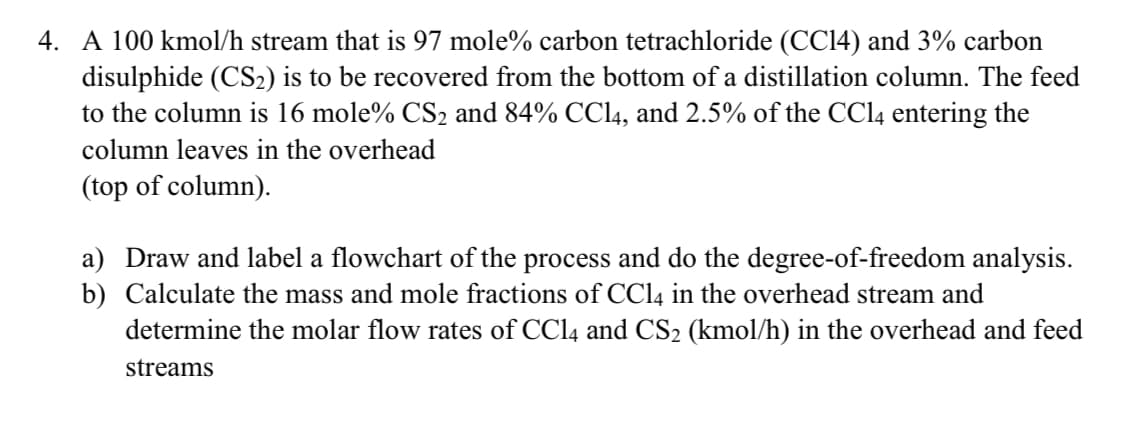A 100 kmol/h stream that is 97 mole% carbon tetrachloride (CCI14) and 3% carbon disulphide (CS2) is to be recovered from the bottom of a distillation column. The feed to the column is 16 mole% CS2 and 84% CC14, and 2.5% of the CC14 entering the column leaves in the overhead (top of column). a) Draw and label a flowchart of the process and do the degree-of-freedom analysis. b) Calculate the mass and mole fractions of CC14 in the overhead stream and determine the molar flow rates of CCl4 and CS2 (kmol/h) in the overhead and feed streams
A 100 kmol/h stream that is 97 mole% carbon tetrachloride (CCI14) and 3% carbon disulphide (CS2) is to be recovered from the bottom of a distillation column. The feed to the column is 16 mole% CS2 and 84% CC14, and 2.5% of the CC14 entering the column leaves in the overhead (top of column). a) Draw and label a flowchart of the process and do the degree-of-freedom analysis. b) Calculate the mass and mole fractions of CC14 in the overhead stream and determine the molar flow rates of CCl4 and CS2 (kmol/h) in the overhead and feed streams
Introduction to Chemical Engineering Thermodynamics
8th Edition
ISBN:9781259696527
Author:J.M. Smith Termodinamica en ingenieria quimica, Hendrick C Van Ness, Michael Abbott, Mark Swihart
Publisher:J.M. Smith Termodinamica en ingenieria quimica, Hendrick C Van Ness, Michael Abbott, Mark Swihart
Chapter1: Introduction
Section: Chapter Questions
Problem 1.1P
Related questions
Question

Transcribed Image Text:4. A 100 kmol/h stream that is 97 mole% carbon tetrachloride (CC14) and 3% carbon
disulphide (CS2) is to be recovered from the bottom of a distillation column. The feed
to the column is 16 mole% CS2 and 84% CC14, and 2.5% of the CCI4 entering the
column leaves in the overhead
(top of column).
a) Draw and label a flowchart of the process and do the degree-of-freedom analysis.
b) Calculate the mass and mole fractions of CC14 in the overhead stream and
determine the molar flow rates of CC14 and CS2 (kmol/h) in the overhead and feed
streams
Expert Solution
This question has been solved!
Explore an expertly crafted, step-by-step solution for a thorough understanding of key concepts.
This is a popular solution!
Trending now
This is a popular solution!
Step by step
Solved in 4 steps with 9 images

Knowledge Booster
Learn more about
Need a deep-dive on the concept behind this application? Look no further. Learn more about this topic, chemical-engineering and related others by exploring similar questions and additional content below.Recommended textbooks for you

Introduction to Chemical Engineering Thermodynami…
Chemical Engineering
ISBN:
9781259696527
Author:
J.M. Smith Termodinamica en ingenieria quimica, Hendrick C Van Ness, Michael Abbott, Mark Swihart
Publisher:
McGraw-Hill Education

Elementary Principles of Chemical Processes, Bind…
Chemical Engineering
ISBN:
9781118431221
Author:
Richard M. Felder, Ronald W. Rousseau, Lisa G. Bullard
Publisher:
WILEY

Elements of Chemical Reaction Engineering (5th Ed…
Chemical Engineering
ISBN:
9780133887518
Author:
H. Scott Fogler
Publisher:
Prentice Hall

Introduction to Chemical Engineering Thermodynami…
Chemical Engineering
ISBN:
9781259696527
Author:
J.M. Smith Termodinamica en ingenieria quimica, Hendrick C Van Ness, Michael Abbott, Mark Swihart
Publisher:
McGraw-Hill Education

Elementary Principles of Chemical Processes, Bind…
Chemical Engineering
ISBN:
9781118431221
Author:
Richard M. Felder, Ronald W. Rousseau, Lisa G. Bullard
Publisher:
WILEY

Elements of Chemical Reaction Engineering (5th Ed…
Chemical Engineering
ISBN:
9780133887518
Author:
H. Scott Fogler
Publisher:
Prentice Hall


Industrial Plastics: Theory and Applications
Chemical Engineering
ISBN:
9781285061238
Author:
Lokensgard, Erik
Publisher:
Delmar Cengage Learning

Unit Operations of Chemical Engineering
Chemical Engineering
ISBN:
9780072848236
Author:
Warren McCabe, Julian C. Smith, Peter Harriott
Publisher:
McGraw-Hill Companies, The